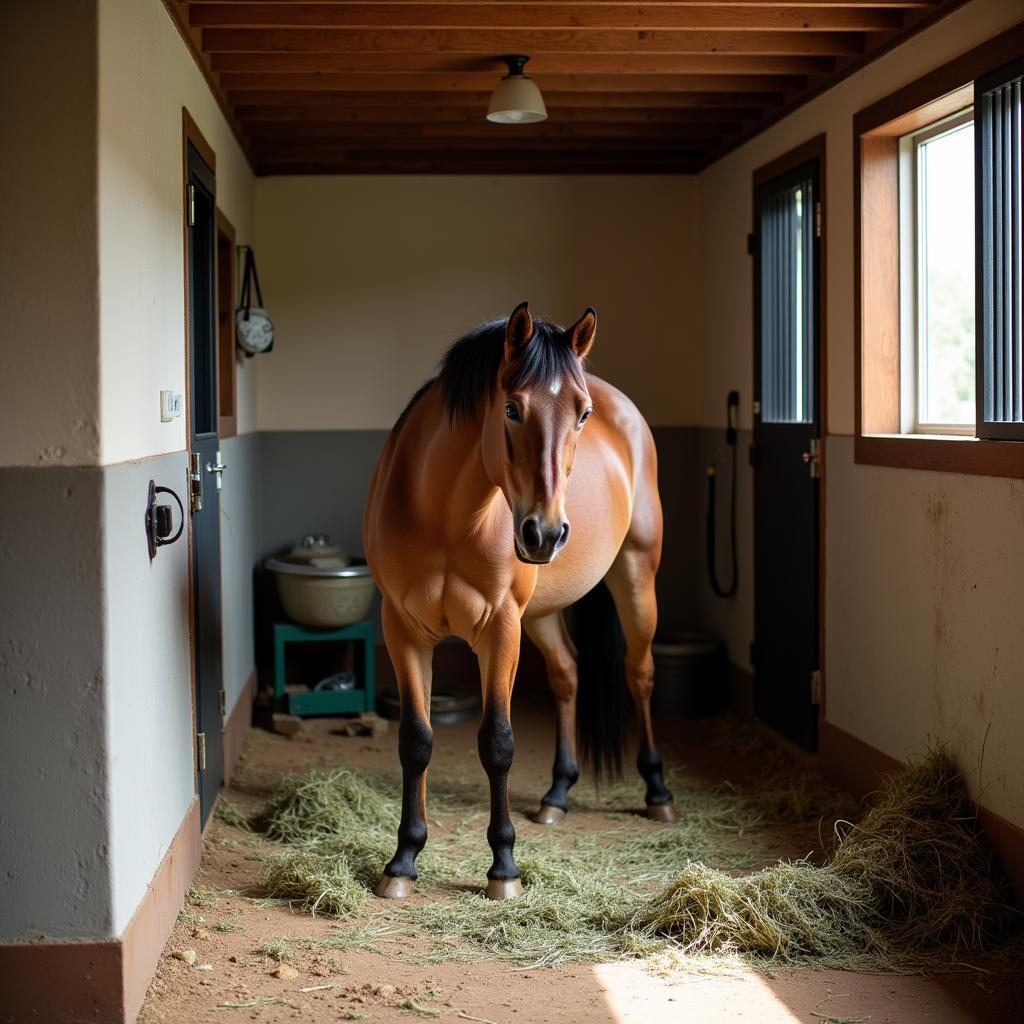Cute Horse Hospital – a phrase that evokes images of miniature horses in tiny hospital beds. While adorable, the reality of equine veterinary care is a bit different, focusing on providing expert medical attention to horses of all sizes. Whether you’re dealing with a minor injury or a serious illness, finding the right care for your horse is crucial. This article will guide you through everything you need to know about choosing a “cute horse hospital” – or rather, the best possible veterinary care for your equine friend.
What to Look for in a Quality Equine Veterinary Clinic
Choosing the right veterinary care is essential for your horse’s health and well-being. While the term “cute horse hospital” might bring to mind a charming, aesthetically pleasing facility, the true measure of quality lies in the expertise and resources available. Here’s what to consider:
- Experienced Veterinarians: Look for a clinic with board-certified equine veterinarians who have a deep understanding of horse anatomy, physiology, and common equine diseases.
- Comprehensive Services: A well-equipped clinic should offer a range of services, including preventative care, emergency services, diagnostics, surgery, and dentistry.
- Advanced Equipment: Modern diagnostic tools, such as digital X-ray, ultrasound, and endoscopy, are crucial for accurate diagnoses and effective treatment.
- Clean and Sterile Environment: A clean and well-maintained facility minimizes the risk of infection and promotes healing.
- Compassionate Care: The staff should be dedicated to providing compassionate and individualized care for each horse.
Understanding Different Types of Equine Veterinary Facilities
There’s a range of facilities that provide care for horses, each with its own focus and capabilities. While a “cute horse hospital” might imply a smaller, specialized clinic, the reality is that equine veterinary care is often delivered in various settings:
- Private Equine Veterinary Practices: These practices typically offer routine and emergency care, as well as preventative medicine.
- Equine Specialty Hospitals: These hospitals provide advanced diagnostics, specialized surgeries, and critical care for complex medical conditions.
- University Veterinary Hospitals: Often associated with veterinary schools, these hospitals offer cutting-edge treatments and research opportunities.
- Mobile Veterinary Services: These services bring veterinary care directly to your barn, offering convenience for routine procedures and non-emergency situations.
What Happens in a “Cute Horse Hospital” (or any Equine Veterinary Facility)?
Regardless of the specific setting, the core principles of equine veterinary care remain the same. When you take your horse to any veterinary facility, here’s what you can expect:
- Initial Assessment: The veterinarian will conduct a thorough physical examination, taking your horse’s vital signs and asking about their medical history.
- Diagnostic Testing: Depending on the suspected condition, the vet may recommend diagnostic tests, such as blood work, X-rays, or ultrasounds.
- Treatment Plan: Based on the diagnosis, the veterinarian will develop a personalized treatment plan, which may include medication, surgery, or other therapies.
- Monitoring and Follow-up: The veterinary team will monitor your horse’s progress and provide ongoing care as needed.
Choosing the Right “Cute Horse Hospital” for Your Horse
Finding the right equine veterinary care is a crucial decision. While the term “cute horse hospital” might capture the emotional connection we have with our equine companions, the practical considerations outlined above will ultimately guide you towards the best choice. Remember, the ideal facility will offer experienced veterinarians, comprehensive services, advanced equipment, a clean environment, and compassionate care.
“Finding a veterinarian you trust is essential,” says Dr. Emily Carter, DVM, a seasoned equine veterinarian with over 20 years of experience. “A strong veterinarian-client-patient relationship built on communication and trust will ensure your horse receives the best possible care.”
 Horse recovering in a stable after treatment
Horse recovering in a stable after treatment
Conclusion
While a “cute horse hospital” might sound appealing, it’s important to prioritize the quality of care and expertise offered by an equine veterinary facility. By focusing on factors such as experienced veterinarians, comprehensive services, and a clean environment, you can ensure your beloved equine companion receives the best possible care. Choosing the right veterinary team will contribute significantly to your horse’s overall health and well-being, allowing them to thrive for years to come.
FAQ
- What should I do in a horse emergency?
- How often should my horse see a vet?
- What are common horse illnesses?
- How can I find a qualified equine vet near me?
- What are the costs associated with equine veterinary care?
- What is the difference between an equine vet and a regular vet?
- How can I prepare my horse for a vet visit?
Looking for more information on horse care? Check out our other articles on [suggested link to another relevant article on your website], and [suggested link to another relevant article on your website].
Need help finding the perfect “cute horse hospital” for your horse? Contact us! Call: 0772127271, Email: [email protected] or visit us at: QGM2+WX2, Vị Trung, Vị Thuỷ, Hậu Giang, Việt Nam. We have a 24/7 customer support team ready to assist you.